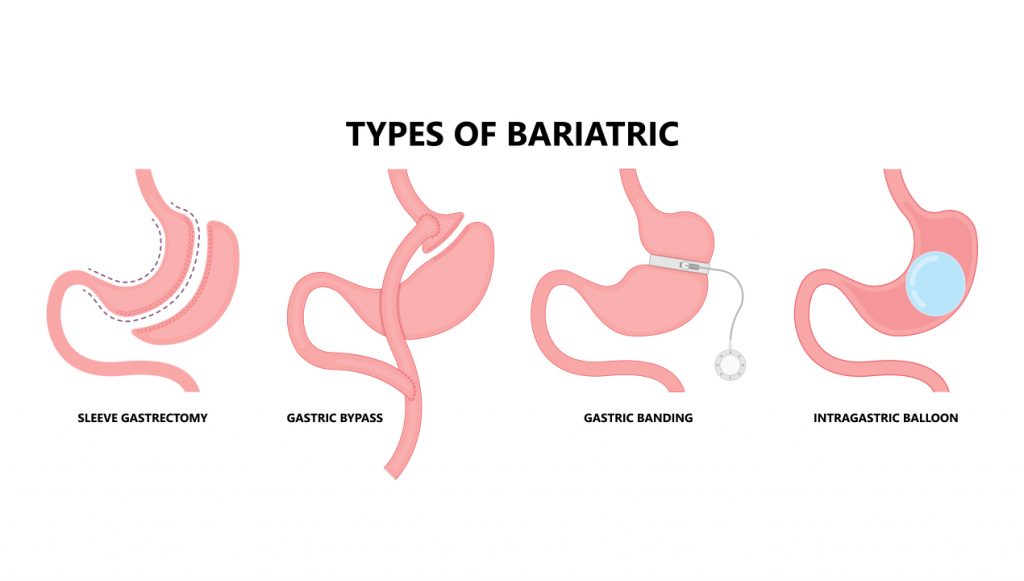Bariatric surgery, also known as weight loss surgery, is a surgical procedure that aims to help people lose weight. This type of surgery is typically recommended for people who are severely obese and have tried unsuccessfully to lose weight through diet and exercise. Bariatric procedures are among the best researched treatments in contemporary medicine because they have been improved over many years. With the aid of minimally invasive surgical methods, they are carried out through tiny incisions (laparoscopic and robotic surgery). These developments make it possible for patients to experience a better overall outcome with less discomfort, fewer complications, shorter hospital stays, and a quicker recovery. These procedures are much less likely to cause complications. These procedures aim to alter the stomach and intestines in order to treat obesity and associated diseases. The procedures could reduce the size of the stomach and also bypass a section of the intestine. This reduces the amount of food consumed and alters how the body uses food for energy, which increases feelings of fullness and decreases hunger. The body’s capacity to reach a healthy weight is enhanced by these procedures.
In recent years, there have been several trends and developments in the field of bariatric surgery that are worth exploring.
Present Trends in Bariatric Surgery:
- Increasing Popularity: Bariatric surgery has become increasingly popular in recent years, as more people have come to recognize its effectiveness in helping people lose weight and improve their overall health. According to the American Society for Metabolic and Bariatric Surgery (ASMBS), there were over 252,000 bariatric surgeries performed in the US alone in 2018.
- Improved Surgical Techniques: The surgical techniques used in bariatric surgery have improved significantly in recent years, leading to better outcomes for patients. For example, laparoscopic surgery, which involves making small incisions rather than a large one, has become the preferred technique for many bariatric surgeries. This approach results in less pain, scarring, and a faster recovery time.
- Variety of Procedures: There are several types of bariatric surgeries, including gastric bypass, sleeve gastrectomy, adjustable gastric banding, and biliopancreatic diversion with duodenal switch. Each of these procedures has its own advantages and disadvantages, and the best option for a particular patient will depend on their individual circumstances.

4. Insurance Coverage: Many insurance plans now cover bariatric surgery, making it more accessible to people who might not otherwise be able to afford it. This has contributed to the increasing popularity of the procedure.
Future Scope of Bariatric Surgery:
1. Non-Surgical Procedures: In the future, it is likely that there will be more non-surgical options for weight loss, such as endoscopic procedures that alter the digestive system without the need for surgery. These procedures are still in the early stages of development but could offer a less invasive option for patients.
2. Personalized Treatments: As genetic testing becomes more common, it may be possible to personalize bariatric surgery to individual patients based on their genetic makeup. This could lead to better outcomes and a more individualized approach to weight loss.

3. Increased Focus on Mental Health: Bariatric surgery can be a life-changing procedure, but it is important to recognize that it is not a magic cure for obesity. In the future, there may be more of a focus on the mental health aspects of weight loss, including counseling and support services to help patients manage the emotional and psychological challenges that can come with significant weight loss.
4. Long-Term Follow-Up: Bariatric surgery is not a one-time solution, and patients will need to commit to long-term lifestyle changes to maintain their weight loss. In the future, there may be more emphasis on long-term follow-up care to help patients stay on track and avoid regaining weight.
In conclusion, bariatric surgery has come a long way in recent years, with improved surgical techniques, more insurance coverage, and a wider range of procedures available. Looking ahead, there is a lot of potential for further advancements in the field, including non-surgical options, personalized treatments, increased focus on mental health, and long-term follow-up care. As obesity continues to be a major health concern, bariatric surgery will likely continue to play an important role in helping people achieve a healthier weight and improve their overall health and well-being.

MDForLives is a global healthcare intelligence platform where real-world perspectives are transformed into validated insights. We bring together diverse healthcare experiences to discover, share, and shape the future of healthcare through data-backed understanding.






